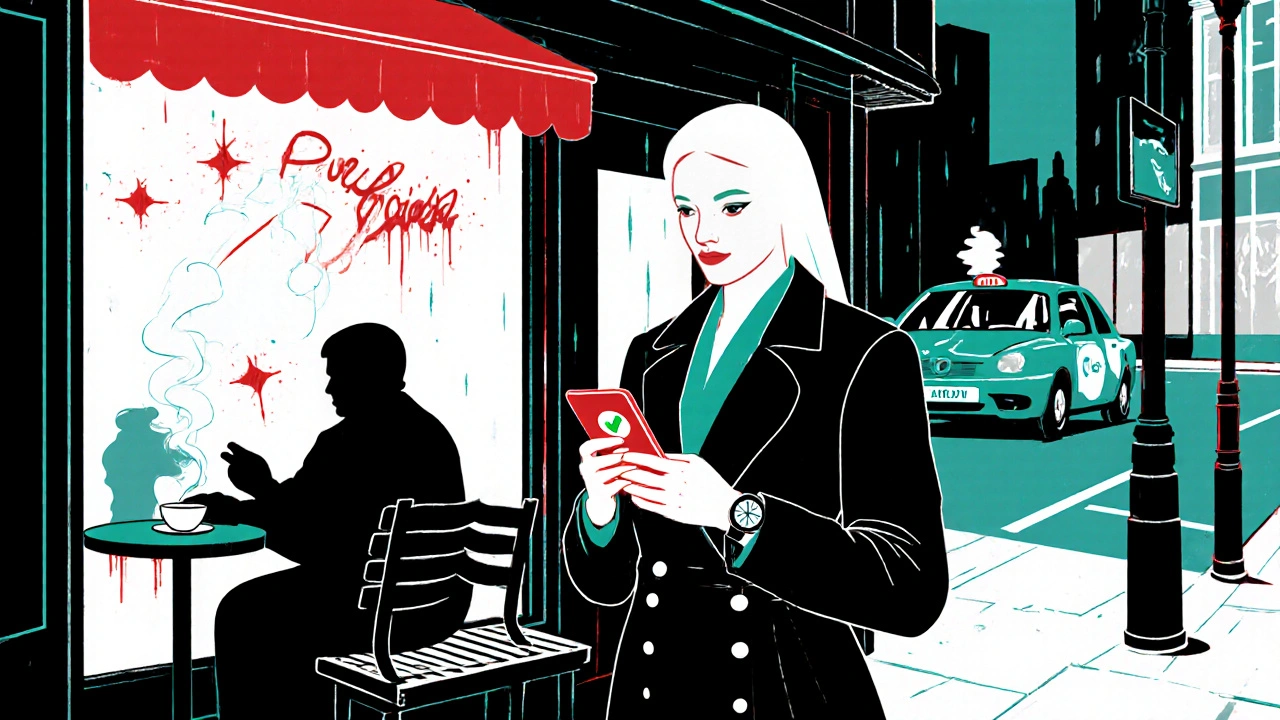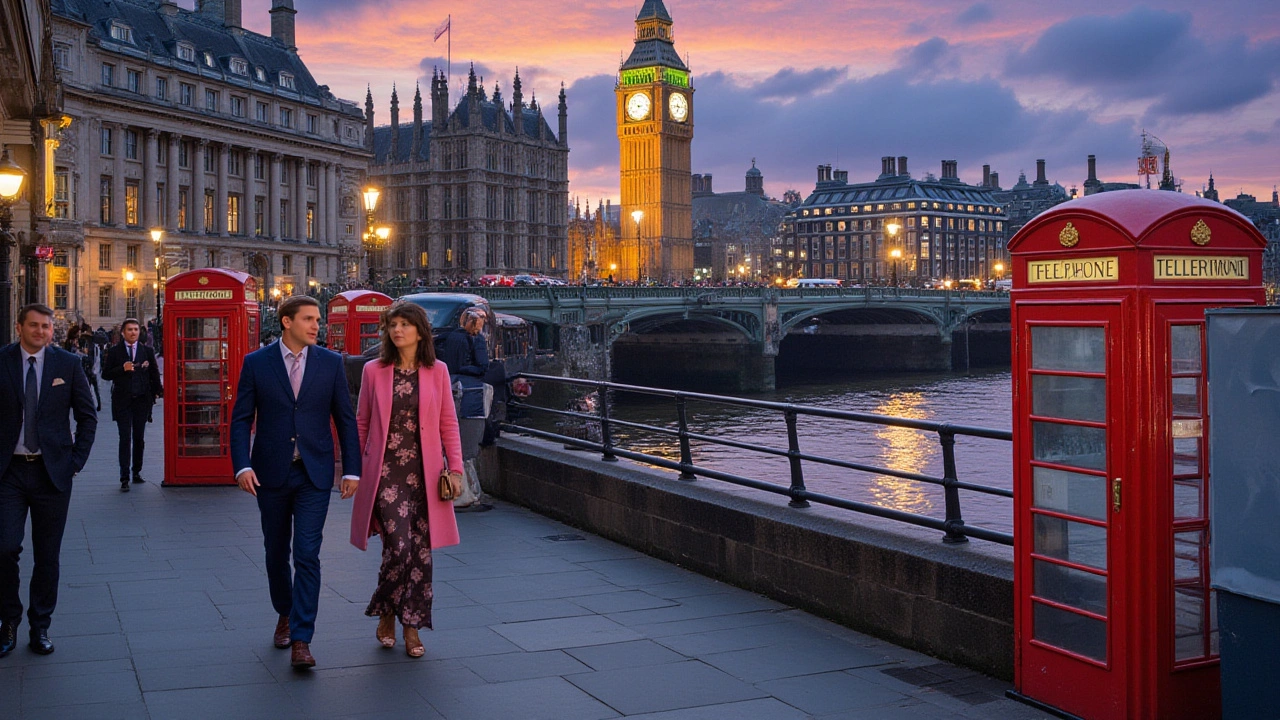
- 26 Oct 2025
- Vivienne Claymore
- 5
British escort is a professional who offers companionship and adult services, typically working in major cities like London. If you’ve ever wondered what a typical shift looks like, this article walks you through a full day-from the early‑morning prep to the late‑night wind‑down-while sharing real anecdotes from the field.
Direct Answer
A British escort in London usually starts the day with self‑care, checks bookings via an online platform, meets clients in upscale venues, and ends with paperwork and safety checks. The routine varies by agency, client type, and personal boundaries, but the core steps remain consistent.
Key Points
- Morning prep mixes fitness, grooming, and mental grounding.
- Agencies and freelance platforms both play big roles in finding work.
- Clients range from business travelers to locals seeking companionship.
- Safety protocols include background checks, location verification, and a trusted “buddy system.”
- Pricing in London typically starts around £250 for a two‑hour session, with premium rates for high‑end venues.
Comprehensive Guide to a Day in the Life
Imagine waking up in a modest flat in London the capital city of the United Kingdom, known for its vibrant nightlife and diverse escort market at 7 am. The first hour is all about self‑care: a quick jog through Hyde Park a large royal park offering a tranquil setting for early‑morning exercise, a shower, and a detailed skin routine. This isn’t vanity-it’s a professional standard that builds confidence for the day ahead.
Definition and Context
In the UK, a British escort is a legally operating adult companion who offers personalized services, ranging from conversation to intimacy, within the bounds of the law operates under a grey‑area framework. While prostitution is illegal, escorting is permitted as long as there’s no exchange of money for sexual services in a public place. This nuance shapes how escorts advertise, where they meet clients, and how they protect themselves.
Benefits of Being an Escort in London
Financial independence tops the list-experienced escorts can earn six figures annually. Flexibility is another plus; shifts can be scheduled around personal commitments. The role also offers a unique window into the city’s elite circles, from high‑end restaurants to exclusive clubs. Many escorts cite personal growth-learning to read social cues, negotiate boundaries, and manage a personal brand-as a rewarding side effect.

Types of Escorts Available in London
London’s market is diverse. You’ll find independent escorts who manage their own bookings, agency‑affiliated escorts who benefit from a structured client pipeline, and niche specialists such as mature escorts professionals over 40 offering experience and confidence to clients seeking seasoned companionship. Each type has its own pricing model, client base, and operational style.
How to Find Escort Services in London
Most escorts now use a blend of discreet websites, verified agency listings, and vetted social media accounts. Popular platforms include Eros a reputable online directory for adult companionship services in the UK and Vibe an app‑based service that connects independent escorts with verified clients. When searching, look for clear privacy policies, client reviews, and secure payment options. A quick tip: always verify the agency’s registration with the local council; legitimate agencies display their licensing information openly.
What to Expect During a Session
A typical two‑hour session starts with a brief check‑in at a pre‑agreed location-often a luxury hotel in Mayfair an upscale London district known for its five‑star hotels and exclusive clubs. After confirming boundaries, the escort may offer conversation, a dinner reservation, or a private massage. The atmosphere is usually relaxed, with soft lighting and curated playlists. Many escorts provide additional touches-like a personalized perfume sample or a short guided tour of a nearby gallery-to make the experience memorable.
Pricing and Booking
London pricing reflects the city’s cost of living and the high expectations of clientele. Entry‑level rates hover around £200‑£250 for two hours, while premium escorts in Central London can command £500+ for extended sessions or specialty services. Booking is usually done through a secure portal; the client pays a deposit, and the balance is settled after the session via discreet payment methods like cryptocurrency or encrypted credit‑card processors. Transparent pricing tables are essential-both for client trust and regulatory compliance.

Safety Tips
Safety is non‑negotiable. First, always run a client through a verification service-many agencies subscribe to “KYC” (Know Your Customer) tools that cross‑check ID and background. Second, choose public‑first meetings, such as a café in Soho a central London neighbourhood famous for its nightlife and entertainment venues, before moving to a private setting. Third, maintain a “buddy system”: share your itinerary with a trusted friend who checks in after each appointment. Finally, have a pre‑agreed safe‑word or signal in case the situation turns uncomfortable.
Comparison Table: Escort vs. Companion Service in London
| Aspect | Escort (Traditional) | Companion Service (Premium) |
|---|---|---|
| Legal Status | Operates within legal grey‑area; no explicit exchange of sex for money in public | Explicitly framed as “social companionship” with stringent contracts |
| Typical Rate (2 hrs) | £200‑£350 | £500‑£1,200 |
| Clientele | Business travelers, local professionals | CEOs, celebrities, high‑net‑worth individuals |
| Booking Method | Online platforms, agency portals | Personal liaison, private concierge services |
| Safety Protocols | Standard verification, buddy check | Full background vet, personal security detail optional |
FAQ: Your Questions About a British Escort’s Day Answered
Is escorting illegal in London?
No. Escorting is legal as long as no money is exchanged for sexual services in a public place. Agencies and independent escorts must follow local licensing rules.
How do escorts verify client safety?
Most use a KYC verification service, request ID copies, and run background checks. A trusted friend is informed of the appointment details as an extra safeguard.
What’s a typical earnings range for a London escort?
Seasoned escorts can make £30,000‑£80,000 per year, with top‑tier professionals exceeding six figures when working high‑end events and private bookings.
Do escorts need a special license?
Agencies must register with the local council. Independent escorts often operate under a business name and follow tax regulations, but there’s no specific “escort license.”
Can I book an escort for a single evening?
Absolutely. Most services offer one‑off bookings, though repeat clients often receive loyalty discounts.
Call to Action
Curious about what a day really feels like, or ready to explore the London escort scene for yourself? Use a reputable platform, keep safety first, and you’ll discover a side of the city most people never see.




5 Comments
Thanks for the thorough breakdown :) It really shines a light on how professional the whole process is. I appreciate the focus on safety and self‑care, which often gets overlooked. The detail about the buddy system is especially reassuring for anyone considering this line of work. Your friendly tone makes the topic approachable for newcomers and the curious alike.
Keep the inclusive vibe going!
This article glorifies a shady industry. It's just prostitution dressed up in fancy words. The UK laws are clear, and this kind of “professionalism” doesn't change that.
The phrase "a professional who offers companionship and adult services" should be hyphenated as "adult‑services".
Wow, such an insightful piece! I love seeing the focus on safety and self‑care – those are super important. The tip about using a buddy system is gold, it really helps keep everyone safe. Keep sharing these helpful guides, they make a big diffrence for newcomers.
It is fascinating how the escort industry in London mirrors broader societal dynamics, serving as a microcosm of power, consent, and economics. The daily routine described in the article reveals a disciplined approach that goes beyond mere transaction, emphasizing self‑care, safety protocols, and emotional labor. From a philosophical standpoint, the practice forces us to confront the boundaries we set between intimacy and commerce. The presence of a “buddy system” underscores an implicit acknowledgment of vulnerability that any independent worker may face, reinforcing the communal aspect even in solitary work. By framing escorting as a legitimate profession, the narrative challenges traditional moral judgments and invites a re‑evaluation of stigma. The financial independence highlighted parallels the aspirations of many gig‑economy participants, yet the stakes are amplified by the personal nature of the service. Safety measures such as KYC verification and public‑first meetings represent a form of self‑governance that compensates for the lack of institutional protection. Moreover, the article’s emphasis on personal branding illustrates how individuals curate their identities to navigate client expectations, a phenomenon observable across many modern professions. The inclusion of pricing tables and transparent contracts signals a move toward market rationality, aligning escort services with broader entrepreneurial trends. At the same time, the legal grey‑area status of escorting in the UK raises questions about how law adapts to evolving social practices. The distinction drawn between traditional escorts and premium companion services mirrors class stratifications that pervade other sectors. While the author mentions cryptocurrency as a payment method, this also reflects a deeper desire for anonymity and security in a stigmatized field. The mentorship aspect, where experienced escorts teach newcomers about boundaries, echoes apprenticeship models that have existed for centuries. Ultimately, the article serves as a reminder that behind every headline‑grabbing statistic lie real human beings negotiating autonomy, safety, and dignity. Recognizing this complexity can foster a more compassionate public discourse.